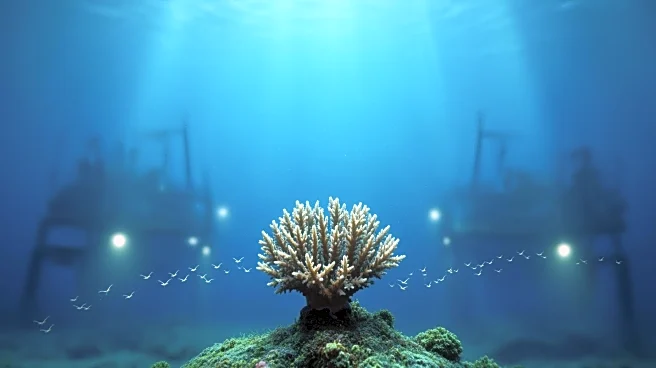What's Happening?
Canadian activist Paul Watson, known for his anti-whaling efforts, has vowed at COP30 in Brazil to fight against deep-sea mining and Norway's krill industry. Watson, who founded Sea Shepherd, is focusing
on marine protection, emphasizing the importance of oceans in combating climate change. He plans to challenge Norway's krill harvesting, which he claims threatens marine ecosystems by depleting food sources for whales and penguins. Watson also aims to oppose deep-sea mining, which scientists warn could damage unknown ecosystems. Despite facing legal challenges from Japan, Watson continues his activism, supported by Brazilian officials.
Why It's Important?
Watson's activism highlights the environmental impact of deep-sea mining and krill harvesting, which are critical issues in marine conservation. The extraction of rare earth minerals from the seabed poses risks to marine biodiversity, while krill harvesting affects the food chain of marine animals. Watson's efforts bring attention to the need for sustainable practices in ocean industries, which are vital for maintaining ecological balance and combating climate change. His actions at COP30 underscore the importance of international cooperation in protecting marine environments and addressing the challenges posed by industrial activities.
What's Next?
With the High Seas Treaty coming into effect in January, Watson plans to confront Norway's krill fishery, advocating for stricter regulations to protect marine ecosystems. His opposition to deep-sea mining aligns with broader environmental concerns, potentially influencing policy discussions at international forums. Watson's continued activism, despite legal challenges, may inspire other environmental groups to join the fight against unsustainable ocean practices. The treaty's implementation could lead to increased scrutiny of ocean industries, prompting governments to consider more stringent environmental protections.
Beyond the Headlines
Watson's activism raises ethical questions about the exploitation of marine resources and the responsibility of nations to preserve ocean biodiversity. The legal challenges he faces highlight the tensions between environmental activism and national interests. His efforts at COP30 reflect a growing movement to prioritize ocean conservation in global climate discussions. The focus on marine protection at the summit may lead to long-term shifts in how countries approach ocean industries, balancing economic interests with environmental sustainability.











